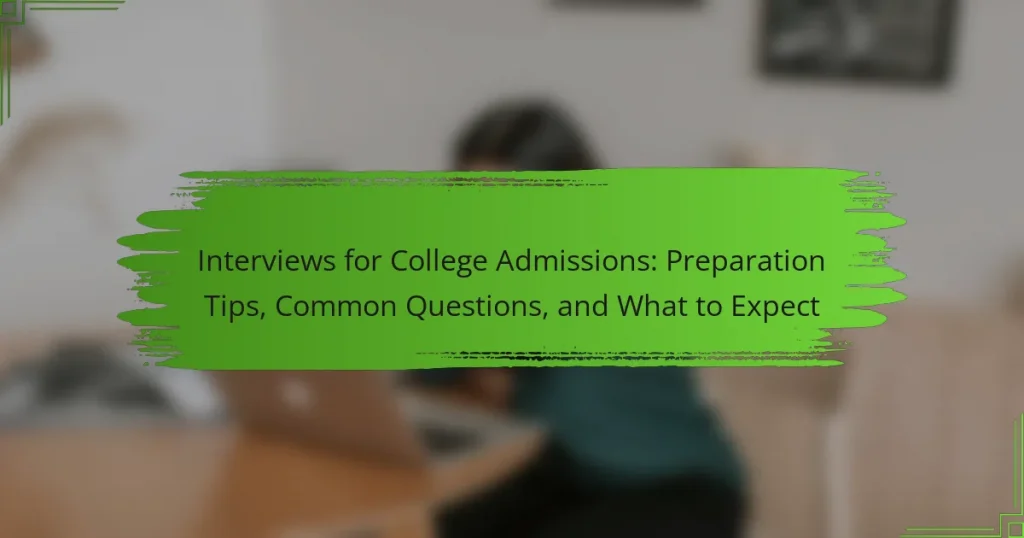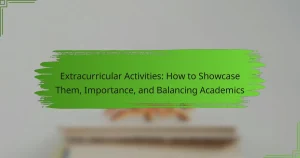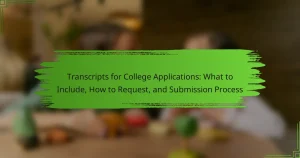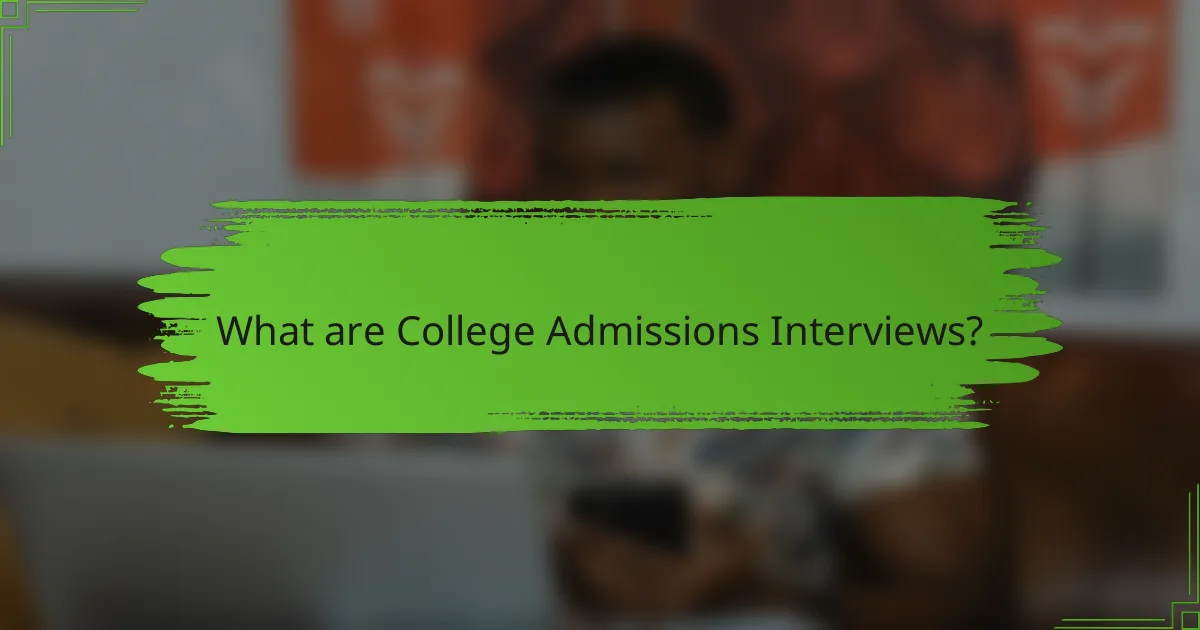
What are College Admissions Interviews?
College admissions interviews are formal discussions between prospective students and college representatives. These interviews aim to assess the applicant’s fit for the institution. They often cover the student’s academic interests, extracurricular activities, and personal goals. Colleges use these interviews to gain insights beyond the application materials. The process can also help students understand the college culture. Interviews may be conducted in person, over the phone, or via video conferencing. Many colleges consider interview performance in their admissions decisions. Research indicates that interviews can enhance the applicant’s overall profile.
Why are College Admissions Interviews important?
College admissions interviews are important because they provide an opportunity for applicants to showcase their personality and interests. These interviews allow colleges to assess an applicant’s fit for their institution. They also enable candidates to ask questions and learn more about the college environment. Research shows that interviews can influence admissions decisions, highlighting their significance. A study by the National Association for College Admission Counseling found that 30% of colleges consider interviews as a very important factor in their decision-making process. This underscores the role of interviews in presenting a holistic view of the applicant beyond grades and test scores.
How do interviews influence the admissions decision?
Interviews significantly influence the admissions decision by providing insights into a candidate’s personality and fit for the institution. Admissions committees use interviews to assess communication skills and critical thinking. They also evaluate how well candidates articulate their goals and motivations. According to a study by the National Association for College Admission Counseling, 24% of colleges consider interviews as a very important factor in admissions decisions. This highlights the role of personal interaction in understanding a candidate beyond their application. Interviews can also clarify any ambiguities in a candidate’s application, such as gaps in academic performance. Ultimately, a strong interview can enhance a candidate’s overall profile and increase their chances of acceptance.
What role do interviews play in showcasing a candidate’s personality?
Interviews play a crucial role in showcasing a candidate’s personality. They provide an opportunity for candidates to express their thoughts, values, and motivations. Through verbal communication, candidates reveal their confidence and interpersonal skills. Non-verbal cues, such as body language, also contribute to the perception of personality. Interviewers can assess how candidates handle pressure and respond to questions. This interaction allows for a deeper understanding of a candidate beyond their resume. Research shows that personal interactions in interviews correlate with future performance in academic settings. Thus, interviews effectively highlight the unique attributes of a candidate’s personality.
What types of interviews can applicants expect?
Applicants can expect several types of interviews during the college admissions process. Common formats include one-on-one interviews, which involve a direct conversation with an admissions officer. Group interviews may also occur, allowing applicants to interact with each other and assess their collaborative skills. Panel interviews consist of multiple interviewers questioning a single applicant, providing a broader perspective on the candidate. Some colleges may offer alumni interviews, where graduates discuss the applicant’s fit for the institution. Additionally, virtual interviews have become increasingly popular, allowing for remote participation. Each interview type aims to evaluate the applicant’s qualifications and fit for the college.
What is the difference between in-person and virtual interviews?
In-person interviews occur face-to-face, while virtual interviews take place online. In-person interviews allow for direct interaction, body language observation, and a more personal connection. Virtual interviews offer convenience, flexibility, and accessibility from any location with internet access. According to a 2021 study by the National Association of Colleges and Employers, 70% of employers reported using virtual interviews in their hiring processes. This indicates a growing trend towards virtual formats, especially in college admissions. Each format has its advantages, impacting the overall interview experience.
How do panel interviews differ from one-on-one interviews?
Panel interviews involve multiple interviewers assessing a single candidate, while one-on-one interviews consist of one interviewer and one candidate. In panel interviews, candidates face questions from several perspectives simultaneously. This format can lead to diverse insights and opinions about the candidate’s fit. Conversely, one-on-one interviews allow for a more personal interaction, fostering a deeper connection. Panel interviews tend to be more structured, with each interviewer focusing on specific criteria. One-on-one interviews may offer flexibility in questioning and discussion. Research indicates that panel interviews can reduce individual bias, promoting a more balanced evaluation of candidates.
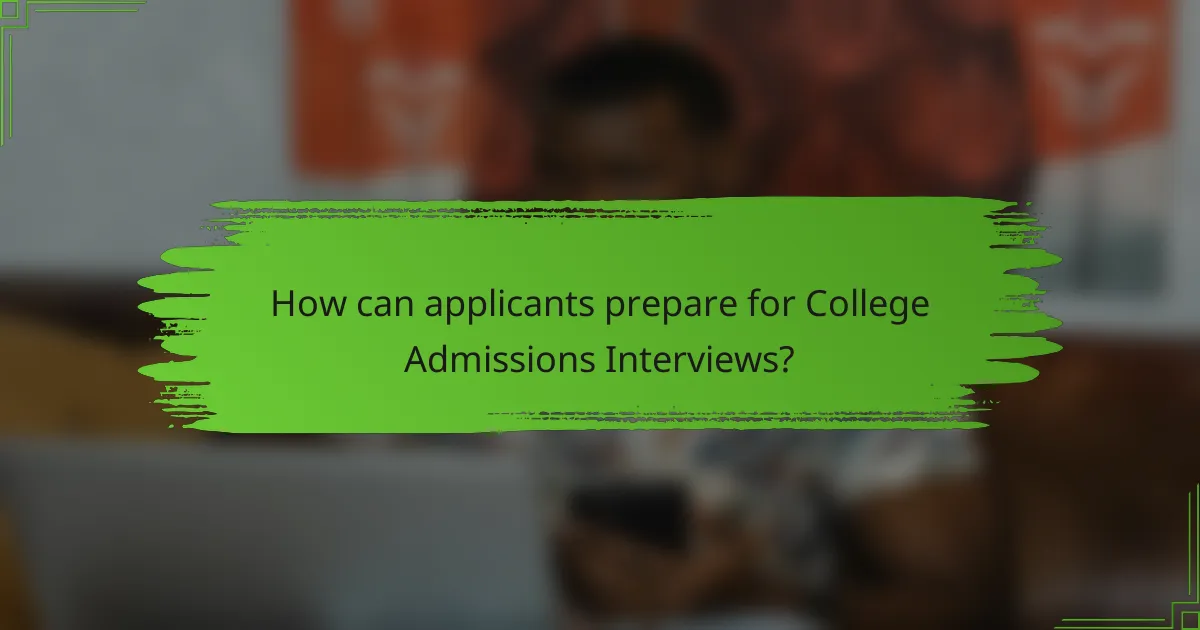
How can applicants prepare for College Admissions Interviews?
Applicants can prepare for college admissions interviews by researching the institution and practicing common interview questions. Understanding the school’s values and programs helps tailor responses. Practicing answers with a friend or mentor builds confidence. Applicants should also prepare questions to ask the interviewer. Dressing appropriately is essential to make a good first impression. Being punctual demonstrates respect for the interviewer’s time. Applicants should showcase their strengths and experiences relevant to the college. Finally, reflecting on personal goals and aspirations can provide clarity during the interview.
What are the essential preparation steps for applicants?
Applicants must follow several essential preparation steps for college admissions interviews. First, they should research the college and its programs thoroughly. Understanding the institution’s values and offerings helps tailor responses. Next, applicants should practice common interview questions. Familiarity with typical queries enhances confidence and clarity. They should also prepare questions to ask the interviewer. This demonstrates interest and engagement in the program. Additionally, applicants must choose appropriate attire for the interview. Professional appearance impacts first impressions. Finally, it is crucial to conduct mock interviews. This practice helps refine communication skills and body language. These steps collectively increase the likelihood of a successful interview outcome.
How should applicants research the college before the interview?
Applicants should research the college by exploring its official website. This includes reviewing the academic programs, faculty, and campus culture. Applicants can also check the college’s mission statement and values. They should familiarize themselves with notable alumni and their achievements. Reading recent news articles about the college can provide insights into current events and developments. Additionally, applicants might connect with current students or alumni for firsthand experiences. Understanding the college’s community and extracurricular activities is also beneficial. This thorough research will help applicants formulate relevant questions and demonstrate genuine interest during the interview.
What role does practicing common questions play in preparation?
Practicing common questions plays a crucial role in interview preparation. It helps candidates become familiar with typical interview scenarios. This familiarity reduces anxiety and boosts confidence during actual interviews. Additionally, rehearsing responses allows individuals to articulate their thoughts clearly. It also aids in identifying strengths and weaknesses in their answers. Studies show that practice significantly improves performance in high-pressure situations. For instance, a study by the American Psychological Association found that practice enhances recall and reduces stress. Thus, practicing common questions is essential for effective interview preparation.
What materials should applicants bring to the interview?
Applicants should bring a few essential materials to the interview. A printed copy of their resume is crucial. This document outlines their educational background and experiences. Applicants should also have a list of references ready. This list provides contact information for individuals who can vouch for their character and qualifications. Additionally, bringing a portfolio of relevant work can be beneficial. This portfolio showcases achievements and skills related to the program. Finally, applicants should prepare questions for the interviewer. Having questions demonstrates interest and engagement in the college’s offerings.
How can a well-prepared portfolio enhance an interview?
A well-prepared portfolio enhances an interview by showcasing an applicant’s skills and achievements. It provides tangible evidence of their capabilities. This visual representation allows interviewers to assess the applicant’s fit for the program. A portfolio can include projects, artwork, or research that demonstrate expertise. It also serves as a conversation starter, encouraging dialogue about the applicant’s experiences. Additionally, a well-organized portfolio reflects professionalism and attention to detail. According to a study by the National Association of Colleges and Employers, 70% of employers value portfolios in assessing candidates. This statistic highlights the portfolio’s impact on interview success.
What documents are important to have on hand during the interview?
Important documents to have on hand during the interview include your resume, transcripts, and letters of recommendation. The resume provides a summary of your achievements and experiences. Transcripts offer proof of your academic performance. Letters of recommendation highlight endorsements from teachers or mentors. Additionally, having a list of questions for the interviewer shows your interest. Carrying a notepad can help you take notes during the discussion. These documents collectively support your candidacy and demonstrate preparedness.

What common questions can applicants expect during College Admissions Interviews?
Common questions applicants can expect during college admissions interviews include inquiries about their academic interests. Interviewers often ask about the applicant’s favorite subjects and why they enjoy them. Another frequent question involves extracurricular activities. Applicants may be asked to describe their involvement and what they learned from those experiences.
Interviewers typically want to know about the applicant’s future goals. They may ask where the applicant sees themselves in five or ten years. Personal strengths and weaknesses are also common topics. Applicants might be prompted to discuss what they believe are their key attributes.
Additionally, interviewers often inquire about the reasons for choosing that particular college. Applicants should be ready to articulate what attracts them to the institution. Questions regarding how the applicant handles challenges or setbacks are also prevalent. These questions help assess resilience and problem-solving skills.
Overall, these questions aim to understand the applicant’s personality, motivations, and fit for the college.
What are typical questions asked in college interviews?
Typical questions asked in college interviews include inquiries about academic interests, extracurricular activities, and personal motivations. Interviewers often ask, “Why do you want to attend this college?” This question assesses the applicant’s fit for the institution. Another common question is, “What are your strengths and weaknesses?” This helps interviewers understand self-awareness and personal growth. Additionally, candidates may be asked about their favorite subjects or books. This reveals their intellectual passions. Questions about future goals, such as “Where do you see yourself in five years?” are also prevalent. These questions gauge ambition and planning. Lastly, interviewers may ask, “How do you handle challenges?” This assesses problem-solving skills and resilience.
How should applicants respond to questions about their strengths and weaknesses?
Applicants should respond to questions about their strengths and weaknesses with honesty and self-awareness. They should identify a few key strengths relevant to the position or program. For weaknesses, applicants should choose an area for improvement that they are actively working on. They should provide examples to illustrate their strengths in action. When discussing weaknesses, applicants should explain the steps they are taking to address them. This approach demonstrates personal growth and a willingness to learn. Research shows that self-reflection is crucial in interviews, as it helps applicants articulate their value effectively.
What is the best way to answer questions about future goals?
The best way to answer questions about future goals is to be specific and honest. Clearly articulate your aspirations and how they align with your interests. For example, if you aim to pursue a career in medicine, explain your motivation and relevant experiences. Incorporate short-term and long-term goals for a comprehensive view. Mention any educational steps you plan to take. This approach demonstrates clarity and commitment. Research shows that specific goal-setting enhances motivation and achievement (Locke & Latham, 2002).
How can applicants handle unexpected or challenging questions?
Applicants can handle unexpected or challenging questions by staying calm and focused. They should take a moment to think before responding. This pause can help clarify their thoughts. Applicants can also rephrase the question to ensure understanding. Providing a structured response can demonstrate critical thinking. Using examples from personal experiences can make answers more relatable. Practicing with mock interviews can prepare applicants for various scenarios. Research shows that preparation reduces anxiety and improves performance in interviews.
What strategies can help maintain composure when faced with tough questions?
Practicing active listening is a key strategy to maintain composure during tough questions. This involves fully concentrating on the question being asked. It helps to avoid reacting impulsively and allows time for thoughtful responses. Taking a deep breath can also reduce anxiety. This simple act can calm the nervous system and improve focus. Pausing before answering gives time to organize thoughts. It shows confidence and control over the situation. Using positive self-talk reinforces a calm mindset. Reminding oneself of past successes can boost confidence. Finally, preparing for potential questions in advance can enhance readiness. Familiarity with the content leads to increased composure.
How can applicants turn tricky questions into opportunities to showcase their skills?
Applicants can turn tricky questions into opportunities by reframing them to highlight relevant skills. They should first pause to understand the question fully. This allows them to identify key components that relate to their experiences. By connecting their past challenges to the question, applicants can demonstrate problem-solving abilities. For instance, if asked about a failure, they can discuss what they learned and how they improved. This approach shows resilience and adaptability, traits valued by admissions committees. Additionally, using the STAR method (Situation, Task, Action, Result) can effectively structure their responses. This method provides clarity and showcases their achievements in a concise manner.

What should applicants expect during and after the interview?
Applicants should expect a structured conversation during the interview. This includes questions about their background, interests, and motivations. Interviewers may also ask about specific experiences related to their academic pursuits. Applicants should prepare to articulate their goals and how the institution aligns with them.
After the interview, applicants can expect a follow-up communication regarding their application status. This may occur within a few weeks after the interview. Some institutions provide feedback on the interview process. Others may not disclose specific details but will inform applicants of their admission decision.
Overall, the interview serves as a chance for applicants to showcase their fit for the college. It also allows institutions to assess candidates beyond their academic records.
How long do college admissions interviews typically last?
College admissions interviews typically last between 30 to 60 minutes. This duration allows sufficient time for both the interviewer and the candidate to engage in meaningful conversation. Many institutions aim for a balance of thorough evaluation and respect for the applicant’s time. Interviews shorter than 30 minutes may not provide enough opportunity for comprehensive assessment. Conversely, interviews extending beyond 60 minutes can lead to fatigue and reduced engagement.
What are the key indicators of a successful interview?
Key indicators of a successful interview include clear communication, mutual engagement, and positive body language. Clear communication demonstrates the interviewee’s ability to articulate thoughts effectively. Mutual engagement occurs when both the interviewer and interviewee actively participate in the discussion. Positive body language, such as maintaining eye contact and nodding, indicates confidence and attentiveness. Additionally, a strong rapport between the interviewer and interviewee can signal a successful connection. Feedback from the interviewer can also serve as a crucial indicator, as positive comments suggest a favorable impression.
How can applicants follow up after the interview?
Applicants can follow up after the interview by sending a thank-you email. This email should be sent within 24 to 48 hours post-interview. In the email, applicants should express gratitude for the opportunity to interview. They should also reiterate their interest in the program. Mentioning a specific topic discussed during the interview can personalize the message. Keeping the email concise and professional is essential. Research shows that timely follow-ups can positively influence admission decisions.
What tips can enhance overall interview performance?
To enhance overall interview performance, preparation is essential. Research the college and its programs thoroughly. Understand their values, culture, and what they seek in candidates. Practice common interview questions with a friend or mentor. This helps in articulating thoughts clearly. Dress appropriately to make a positive first impression. Body language matters; maintain eye contact and sit up straight. Arrive early to show punctuality and respect for the interviewer’s time. Prepare thoughtful questions to ask the interviewer, demonstrating interest and engagement. Follow-up with a thank-you note to reiterate your appreciation and interest in the college. These strategies collectively improve performance and leave a lasting impact.
How can body language impact interview outcomes?
Body language significantly impacts interview outcomes by influencing perceptions of confidence and engagement. Non-verbal cues such as posture, eye contact, and gestures communicate enthusiasm and professionalism. Studies indicate that 55% of communication is non-verbal, highlighting its importance in interviews. For example, maintaining eye contact can create a sense of trust and connection with the interviewer. Conversely, closed body language, like crossed arms, may suggest defensiveness or disinterest. Research by Albert Mehrabian emphasizes that body language can affect how candidates are perceived, potentially impacting hiring decisions. Therefore, effective body language can enhance a candidate’s chances of success in college admission interviews.
What are the best practices for creating a positive first impression?
To create a positive first impression, dress appropriately and maintain good posture. First impressions are often formed within seconds. Research indicates that appearance influences perceptions of competence and trustworthiness. A firm handshake conveys confidence. Additionally, making eye contact shows engagement and sincerity. Smiling can create a welcoming atmosphere. Active listening demonstrates respect and interest in the conversation. Finally, being punctual reflects reliability and professionalism. These practices collectively contribute to a favorable initial perception during college admissions interviews.
Interviews for college admissions are formal discussions aimed at assessing prospective students’ fit for an institution. The article covers the importance of these interviews, their influence on admissions decisions, and the various types applicants may encounter. It provides essential preparation tips, including researching the college, practicing common questions, and understanding the role of body language. Additionally, the article outlines typical interview questions and strategies for responding effectively, as well as post-interview follow-up practices to enhance applicants’ chances of success.
